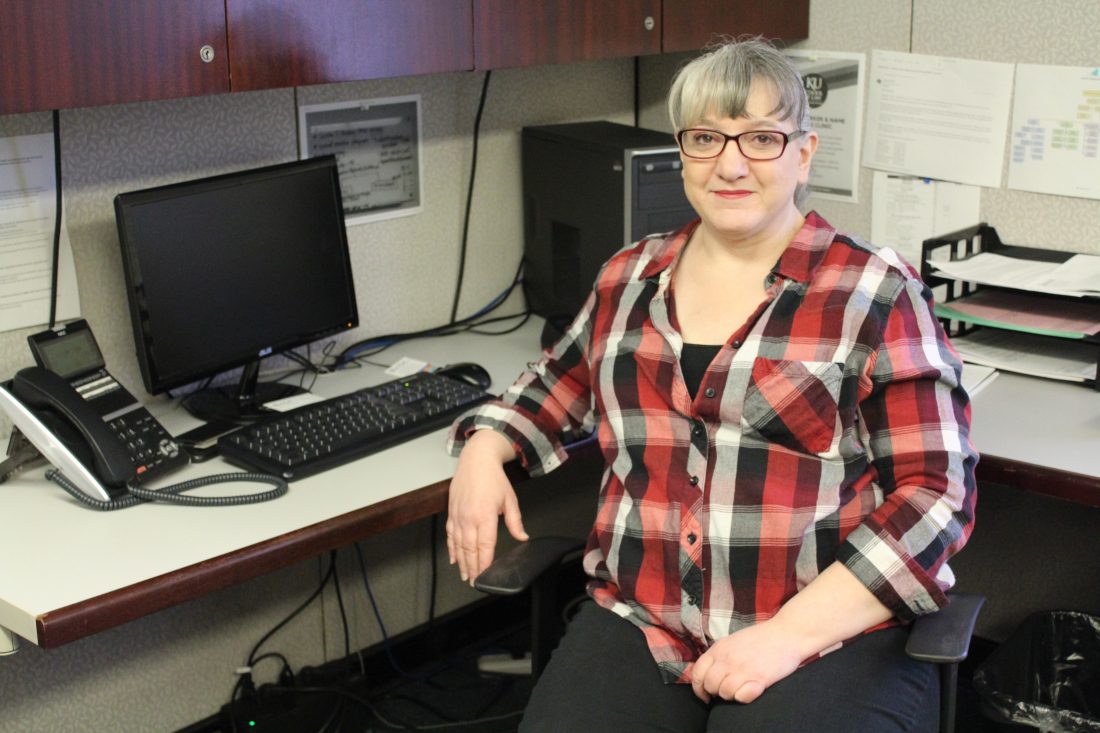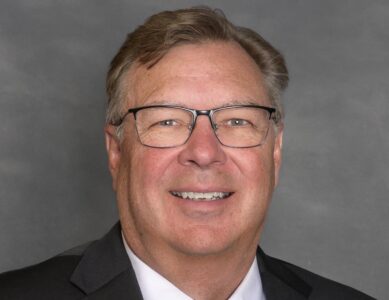‘Meet people where they are’: Douglas County peer support program expands to library, housing authority

photo by: Lauren Fox
Derek Mecca is a peer fellow at Lawrence Public Library, where he recently has been inviting people to speak with him by offering to play a game of chess.
“Check,” Derek Mecca’s challenger told him Thursday in the lobby of the Lawrence Public Library.
Mecca moved his king one place to the left. His opponent nodded, a recognition of a move well-made. Minutes later, his challenger departed from him with a loss, but for Mecca, the real victory came simply from the friendly interaction with a stranger.
Mecca can be seen in the library three times per week, often with a chess set before him, waiting to welcome his next challenger. He’s one of the Douglas County peer fellows, and a sign at his table says, “Feeling down, lonely or just need to vent? Talk to us.”

photo by: Lauren Fox
Derek Mecca, a Douglas County peer support fellow at Lawrence Public Library, plays a game of chess against a library-goer Jan. 23, 2020, in the library’s lobby.
The peer fellow program, as the Journal-World has previously reported, is a year-long internship-type experience in which members of the community who have experienced mental health issues can give back by helping those who are undergoing similar challenges. Previously, the fellows worked solely in the emergency department at LMH Health. At the end of October, the program expanded to the library and the Lawrence-Douglas County Housing Authority.
Mecca, who previously worked at the hospital, started setting out a chess board at his table at the library to encourage people to come interact with him. Whereas everyone Mecca worked with at LMH Health was in crisis, that is not the case at the library.
“My thought was, how do I create an opening for people for interactions?” he said. “Just walking up to somebody and saying, ‘Hey, you’re struggling, would you like to talk?’ wouldn’t be appropriate, so I thought, ‘Well, maybe if I have something to do with somebody it would be less intimidating.'”
Mecca said he’s found that he’s been interacting with people who might not otherwise sit down with him, simply because they want to play chess. That in turn is enabling him to start conversations with his challengers about peer support and mental illness.
“I see people who are struggling with something, and, since we’re at the library, they end up talking about books or maybe asking for certain suggestions,” Mecca said. He helps people find books on the subjects they are struggling with, and he said he’s recently thought of a way he could do even more.
“I was even thinking I could check out the same book that I recommend to somebody and read it, too, and expand my own knowledge on the different things,” he said. “Because I don’t know everyone’s struggle. I don’t know all of it.”
Mecca said mental health has been a subject of his entire life, and that he has suffered childhood trauma, loss and abuse.
Bob Tryanski, Douglas County’s director of behavioral health projects, said the peer fellow program is an effort to integrate peer support across the county’s system of care.
“That means having people with lived experience, who are able to draw on that lived experience to connect, to build trust, and to really provide support for people who are in the community and who are struggling because they have a serious mental illness or they have an addiction issue,” he said.
There are currently 11 peer fellows. Three work at the library, and two work at the housing authority. The rest work at the hospital, where the program started.
The program’s expansion to the library and housing authority is helping peer fellows meet and interact with members of the community before they find them in moments of crisis at the hospital.
“The idea is, ‘Let’s get out into the community and meet people where they are,'” Tryanski said.
At the housing authority, peer fellow Cindy Sturm said she enjoys building relationships with the people she works with.
“I have one client that I take to the grocery store every week,” she said. “We talk about ways to manage her symptoms while we’re on the road.”

photo by: Lauren Fox
Cindy Sturm is a peer fellow who works at the Lawrence-Douglas County Housing Authority. She is pictured at her desk on Jan. 23, 2020.
Like Mecca, Sturm also previously worked as a peer fellow at LMH Health, and said she enjoys being able to see her clients through more than just their stay at the hospital.
“To be able to have a relationship with someone is more fulfilling to me than the brief encounter at the hospital,” she said.
Shannon Oury, the executive director of the housing authority, said the peer fellows have been bringing a new perspective to the organization and made it more welcoming.
Similarly, Melissa Fisher-Isaacs, who coordinates the peer fellows at the library, said she believes the library staff appreciate having the expertise of the fellows, who are better trained to handle social work.
Bill Reilly is the peer support program manager for Bert Nash Community Mental Health Center. The program has come together through the joint partnership of numerous organizations, including Bert Nash, Douglas County and DCCCA.
Reilly said he’s been “amazed” at the work the library has done to promote the program. It has developed “talk to us” posters, as well as “talk to me” pins for the peers who work there.
The library marketing is specifically meant to be broad. A person doesn’t have to have a mental illness to talk to a peer fellow.
“You could be a teenager who’s having problems with mom or dad,” Reilly said, or you may just need to “rant about your job.”
He said the peer fellows’ job is to support the community, whatever that may look like.
And it might simply look like a friendly game of chess in the library lobby.




